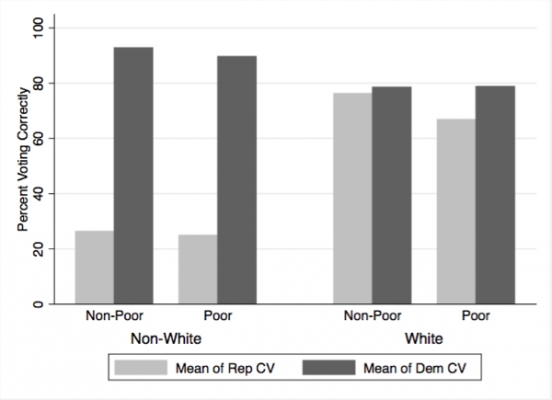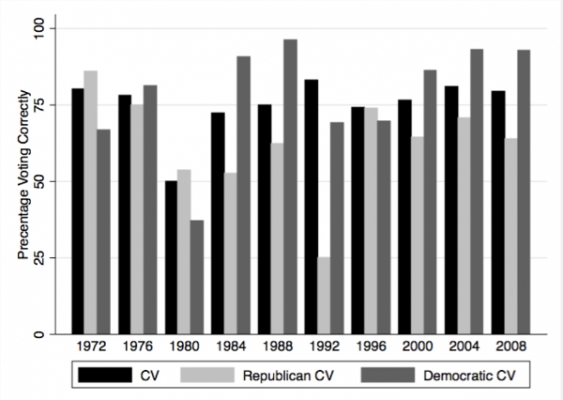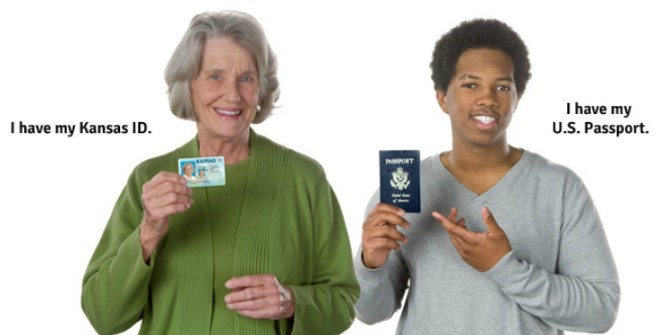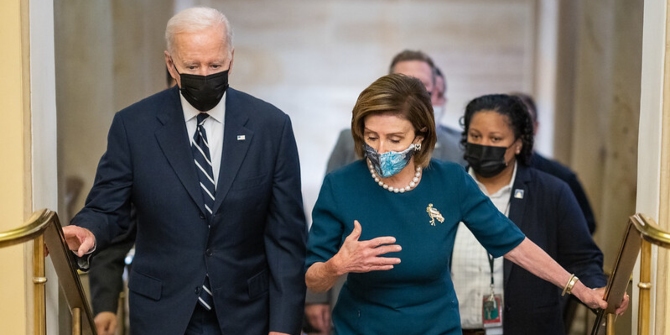


 Recent years have seen the rise of the idea that poor whites in America have developed a tendency to vote for Republicans, who in general do not have their best interests in mind. Using National Election Survey data, Sean Richey, J. Benjamin Taylor, Jeffrey M. Glas and Junyan Zhu take a close look at this idea of ‘incorrect voting’, and find that poor whites actually tend to vote for Democrats – who do better represent their interests – around 75 percent of the time. They also comment that when poor whites do vote against their interests, this tends to be third party candidates, rather than Republicans.
Recent years have seen the rise of the idea that poor whites in America have developed a tendency to vote for Republicans, who in general do not have their best interests in mind. Using National Election Survey data, Sean Richey, J. Benjamin Taylor, Jeffrey M. Glas and Junyan Zhu take a close look at this idea of ‘incorrect voting’, and find that poor whites actually tend to vote for Democrats – who do better represent their interests – around 75 percent of the time. They also comment that when poor whites do vote against their interests, this tends to be third party candidates, rather than Republicans.
Are poor whites less likely to vote correctly in presidential elections? Their voting behavior is routinely the source of consternation in American politics, as many suspect poor whites are mistakenly voting for right-wing demagogues and on conservative social issues. Our recent research uses a ‘voting correctly’ measure to better adjudicate this perennial question in American politics.
We investigated this question to address the concern some have about poor white voters being duped into voting against their interest; a classic argument put forth by Thomas Frank in his 2005 book, What’s the Matter with Kansas. Frank argues that Republicans have been using conservative positions on social issues to encourage poor white voters to betray their economic interests that are presumably better represented by the Democratic Party. Dozens of other pundits have issued other proclamations about poor whites being duped by Republicans. Essentially, all of these writers are making the same argument that poor whites are voting incorrectly for Republicans.
Our research adds to scholars such as Bartels and Gelman, who showed that poor whites actually more often vote for Democratic candidates and prefer the Democratic Party on most social issues. Focusing on the small remaining group of poor whites who vote Republican we find that they do not vote against their beliefs more often than other groups in American politics. Our research empirically validates that poor white voters’ choices typically match their true preferences.
The voting correctly variable we use as our dependent variable is designed by Richard Lau and David Redlawsk. In their book, How Voters Decide, they show how this measure stands up to scrutiny through a series of experiments, and validate their measure with data from US presidential elections using the American National Election Study (NES).
Respondents to the NES were asked a series of policy and issue position questions. They were also asked, in the post-election follow-up survey, the candidate they chose for president. Using candidate placement measures the respondents answered in the early part of the survey, Lau and Redlawsk created a variable to represent if the respondent’s expressed vote choice matches the candidate who best fits their policy and issue preference profile, among other factors. If respondents voted for the candidate with matching attitudes and issue positions, it is coded as ‘voted correctly.’
Figure 1 – Total Percent Voting Correctly by Race and Economics, 1972 – 2008
 Figure 1 shows the percentage of NES respondents between 1972 and 2008 who voted correctly broken down by economic and racial status. There are trivial differences in correct voting (CV) between poor and non-poor white voters. The actual implication of the data in Figure 1 is that non-whites who vote for Republicans are voting incorrectly most often. This is information is rarely discussed in popular media, but may—in fact—be a more important aspect to voting behavior in the United States.
Figure 1 shows the percentage of NES respondents between 1972 and 2008 who voted correctly broken down by economic and racial status. There are trivial differences in correct voting (CV) between poor and non-poor white voters. The actual implication of the data in Figure 1 is that non-whites who vote for Republicans are voting incorrectly most often. This is information is rarely discussed in popular media, but may—in fact—be a more important aspect to voting behavior in the United States.
We also break down the differences in voting correctly by poor whites across all presidential elections between 1972 and 2008 in Figure 2. This is important because there may be years when poor white voters are more or less likely to vote correctly, which could hint at the fodder for this lasting media obsession. Figure 2 shows the total percentage of correct votes in a given election year, the percentage of Republican votes that are correct, and the percentage of Democratic votes that are correct, as measured in the NES, among poor white voters.
Figure 2 – Correct Voting Levels for Poor Whites, by Presidential Election

Overall, poor whites are voting correctly around 75 percent of the time with the exception of 1980. The key here, however, is that there is no systematic advantage for Republican candidates. One can see that there is a high level of randomness in voting correctly among poor whites when separated by political party, and the Republican Party actually often gets fewer incorrect votes from poor whites.
Beyond these impressionistic figures, we create probit models of voting correctly, Republican voting correctly, and Democratic voting correctly. We control respondents’ age, gender, education, partisanship, political interest, political knowledge, candidate distinctiveness, political participation, and residing in the South. We find that—even while controlling for year fixed effects and a series of interaction effects—poor whites are less likely to vote correctly over all, but they are not voting incorrectly more often for Republican candidates. These voters, to the extent they are not voting correctly in the first place, are often voting incorrectly for the variety of also-ran third party candidates who show up in American politics from time to time.
Why Does this Myth Persist?
Why does the myth that poor whites vote against their interest for Republicans persist? It is hard to say, but for many years poor whites have been discussed as a source of political problems. Yet, these problems are often exaggerated or nonexistent, just as we found with our study of poor white voting behavior. For example, much recent conversation focuses on the moral failings of poor whites, such as recent entries by the National Review and Paul Krugman. By nearly every available measure, however, poor white Americans are doing better on traditional measures of social problems. The two issues often identified by critics of poor whites as evidence are unemployment rates (now 6.8 percent) and teenage birthrates. But, both of these are actually relatively low and on the decline.
So, why are some in the media determined to say negative things about this group?
We have a possible hypothesis for why poor whites take a disproportionate amount of blame: These elite pundits are not poor whites, and so they do not know from personal experience and do not care enough about this group to actually research them. We cannot test any of that here, but we are glad to add empirical evidence on the rationality of voting behavior by poor whites in the United States.
This article is based on the paper, ‘Polls and Elections: There Is Nothing Wrong with Kansas: The Effect of Race and Economics on Voting Correctly in U.S. Presidential Elections’ in Presidential Studies Quarterly.
Featured image credit: Peter Rukavina (Flickr, CC-NC-SA-2.0)
Please read our comments policy before commenting.
Note: This article gives the views of the author, and not the position of USAPP – American Politics and Policy, nor the London School of Economics.
Shortened URL for this post: http://bit.ly/1PIkNhM
_________________________________
 Sean Richey – Georgia State University
Sean Richey – Georgia State University
Sean Richey is Associate Professor in the Department of Political Science at Georgia State University. He teaches and researches political communication and political behavior.
 J. Benjamin Taylor – Massachusetts College of Liberal Arts
J. Benjamin Taylor – Massachusetts College of Liberal Arts
J. Benjamin Taylor is assistant professor of political science at Massachusetts College of Liberal Arts in North Adams, Mass. He researches and teaches courses on political communication, media and politics, and American political behavior.
 Jeffrey M. Glas – Georgia State University
Jeffrey M. Glas – Georgia State University
Jeffrey M. Glas is currently a visiting lecturer in the Department of Political Science at Georgia State University. His research agenda focuses on political behavior, cognition, and collective action.
 Junyan Zhu – Georgia State University
Junyan Zhu – Georgia State University
Junyan Zhu is a Ph.D student in political science at Georgia State University. She studies political communication, with a focus on American political behavior, campaigns, elections, and public opinion.






